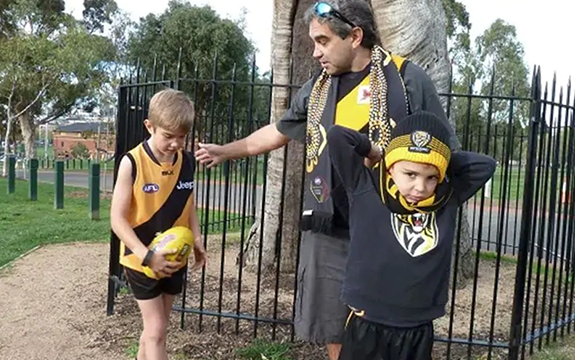Dreamtime at the 'G Reflections

In Summary
- Dr Andrew Peters, a proud Wurundjeri and Yorta Yorta man and long-time Richmond member, shares his reflections on Dreamtime at the 'G and Sir Doug Nicholls Round
- This article was originally published on the Richmond Football Club website
Feeling and being connected is a cornerstone of Indigenous cultures all over the world. Connection to all things around us is a fundamental concept of Aboriginal Australian culture and key ingredient in our ability to remain resilient, strong, and proud in the face of the many challenges that have come along. As an Aboriginal man working in education and a fanatical Richmond supporter, these connections become more apparent, and important, as the years go by.
Being ‘Australian’ for me has a number of meanings, each of which centre on ‘connection’. There is the connection to my family, my cousins, my Elders, my ancestors, my culture. The connection to my hometown of Healesville and the lands I grew up on, connection to the city of Melbourne and the state of Victoria – my home. And of course, my connection to the things I love to do and watch – sports. And in this town, we are all connected to the great game of Australian football. Each year, at this time, this connection is shared by all of us. And it’s a wonderful thing.
‘Dreaming’ for Aboriginal people has many meanings. It is, among other things, the stories of who we were, who we are, and who we will be. It brings together so many aspects of our culture to create a sense of connection and belonging. It helps us feel connected to our family, our kin, our ancestors and our spirits. For me, it’s a connection between the contemporary world I live and work in, and the spiritual world of my ancestors before me. It gives me a real sense of belonging.
The AFL’s Indigenous Round, and Dreamtime at the 'G, allows us all to feel this connection. It is a wonderful example of how Australians can come together and celebrate the world’s oldest living culture – OUR Australian Aboriginal culture – and its core principles of respect, caring and sharing. It’s a wonderful educative tool for young footy fans to use to help them connect to their world. It is symbolic of what is good about our game and our society – connection, competition, support, celebration.
It provides a connection to both the ancient culture of Aboriginal Australia, and the sense of tribalism and loyalty that comes from being an AFL supporter. And in particular, a Richmond supporter. There’s nothing like being surrounded by a big sea of Yellow and Black as we roar in support of our boys on the field. It fills me with such pride to see our boys honouring our Aboriginal culture; to see Shedda as captain wearing a 67 on his back; to see Sydney Stack perform a pre-game ‘war cry’. A celebration of our culture, and a big win over the Bombers. Now there’s a connection!
The AFL and the Richmond and Essendon Football Clubs in particular, have done a wonderful job in getting our Dreamtime at the 'G to what it is today. It’s not a substitute for real learning, and we all as Australians have a lot more to learn and appreciate about our Aboriginal culture and history. But it’s a wonderful example of how an influential sport such as AFL and its clubs can play such a positive role in both educating about Aboriginal culture, and affirming culture for young Aboriginal people.
I simply love being involved – connected – with my Tigers, and especially at this time of year. The drought-breaking premiership of 2017 was hailed by players and staff within the club as being built on recognising and building strong connections. The success of our club has been built on understanding and improving these connections. While it’s a shame we can’t all get together again this year, we can still find ways to keep these connections strong.
To me, being a part of Dreamtime shows not only how connected our club is to each other, but to the culture and history of our country. Strong and bold, just like our ancestors…
Dr Andrew Peters is a proud Wurundjeri and Yorta Yorta man, a Senior Lecturer in Indigenous Studies and Tourism at Swinburne University, and a long-time Richmond member. Andrew is passionate about teaching and strengthening awareness and understanding of Indigenous culture and history, and particularly about acknowledging and valuing contemporary culture.
This article was originally published on the Richmond Football Club website.

